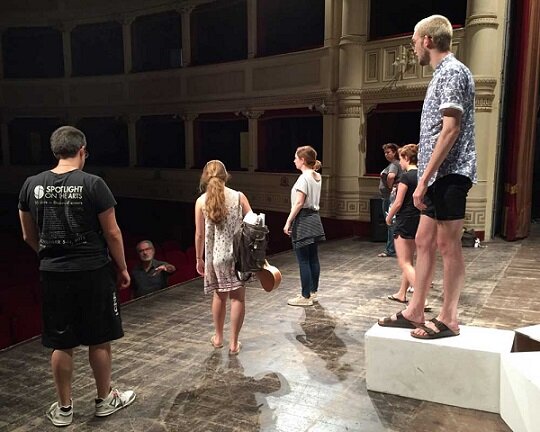Why It's Important to Know Your Blocking
Seana Hendrickson
Sometimes while working with community or youth theatre the purpose or importance of certain theatre expectations gets lost. Often times I have to remind myself that many people do not have years of experience and education in performing. Therefore, we need to give a reminder here and there as to why these things are important. So what am I trying to get at here? I’m talking about the importance of knowing your blocking. Blocking is the set movements given to actors by their director to bring a story to life. Why is it so important to move on this line versus this one? It may seem like a trivial thing when you are the actor who forgets but there are numerous reasons why you should know your blocking.
First and foremost, your director has most likely spent the majority of his/her free time working on this production, creating the story they would like to share with audiences. This means spending countless hours creating specific stage pictures. These pictures are not arbitrary placements, they are thought out with reasoning behind every move. Relationships between characters, dynamics of story, even the inner emotions of character can be displayed through movement onstage. As an actor, it is your job to embody this movement and understand it. If it does not feel right then have a discussion with the director about the choices and come to a compromise, or better understanding at least as to make the blocking work and feel right for you.
Not only is it important to know your blocking out of respect for your director but also for your fellow actors. If your scene partner took the time to write down their blocking and you did not, you can throw off an entire scene. Your castmate was expecting you to move somewhere that their next cross or reaction may count on. It is hard to push you out of the way if you never step forward. Maybe an actor’s entrance relies on you being shoved so a vase breaks and that sound cues them. The importance here is to realize that other people rely on you, so being aware of the purpose of movement and the director’s vision is a vital part of performing.
The most important thing that your blocking will affect is the tech side of a production. Many times actors get into their performance space after rehearsing off-site and they forget all their blocking because it is in a new space. This, in turn, causes weeks of work to fly out the window. While that may be frustrating to the director it is even more frustrating to the lighting designer who has based cues off of blocking. If the lighting designer expects an actor will be standing downstage right by this line and the actor decides to downstage center instead, the rehearsal will have to hold in order to reset the cue, which ultimately spends more time being wasted when everything could have been solved if the actor wrote down their blocking.
I think the lesson to take away from this is that being responsible for yourself is like a domino effect in productions. During your rehearsal process if you write down your blocking and rehearse it exactly as given to you then the transfer to production time will be that much smoother. Acting is not an individual art, it is a team art. No one piece can work without the other to make a production a success. Everything stems from you the actor, so make sure that memorizing your blocking is a pertinent part of your personal rehearsal process.
